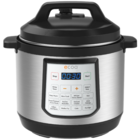Improved Cook Stove Market Size in Mozambique
Introduction
This article provides a snapshot of the improved cookstove (ICS) market in Mozambique particularly the market size and is targeted at private sector, donor organisations, NGOs, Government bodies and other stakeholders who are interested in getting a deeper understanding of the ICS market.
In this article, the term improved cookstoves (ICS) includes efficient cookstoves that burn different solid biomass such as firewood, charcoal, agricultural residues, animal dung and other solid biomass products. Advanced or high tier cookstoves (ACS) are fuelled by LPG, biogas, solar energy or electricity and are mentioned in some sections of this article. ACS are not included in the term ICS, however they are included in the terms clean cooking solutions and clean cooking technologies.
ICS Market Size and Growth Potential
Over the last years, international development organisations and the private sector have realised that the ICS market in Mozambique has largely been overlooked[1]. For this reason, the development organisations are working together with the private sector to mobilise the clean cooking market and thus, opening new investment opportunities. In 2016, it was estimated that about 70,000 ICS were distributed through NGO intervention[2]. By the end of 2020, there was a total of 710,000 beneficiaries of clean cooking, and an expected distribution of an additional 166,000 improved cook stoves[3]. Until March 2022, already over 219,200 stoves were sold in Mozambique by 5 ICS companies (BURN, Pamoja, Sogepal, Mozcarbon and Carbonsink). These 5 companies together have a target to reach over 1 million stoves sales by 2027.[4]
The clean cooking market is estimated to be around 4.5 million households[5] and is expected to grow at 9% (or even 16.1% with tax exceptions) by 2026[6].
Types of ICS in the Market
There is a variety of improved cookstoves available in Mozambique which were introduced by different development programmes. These stoves use different types of fuels ranging from dung and crop residues to ethanol or solar energy. Several of these stoves are manufactured in foreign countries but assembled in Mozambique while others are artisanal stoves produced locally. The following table shows some of the cookstoves available in the market as of 2022:
| Stove model | Fuel used | Fuel savings | Thermal efficiency | Price | Companies offering these products in Mozambique | Production |
|---|---|---|---|---|---|---|

Mbaula Poupa+ |
charcoal | 60% | Mozcarbon | |||
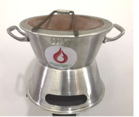
Mbaula Poupa+++ |
charcoal | 70% | 42.3% | 500-600 Mts | Carbonsink | locally produced, semi-industrial |
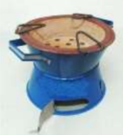 Mbaula B Mbaula B
|
charcoal | 70% | 42.3% | 250-300 Mts | Carbonsink, KULIMA | locally produced, semi-industrial |

|
charcoal | 70-78% | 43.3% | 500-600 Mts | Carbonsink, Mozcarbon | Imported from Kenya |

Envirofit Econochar |
charcoal | 67% | Mozcarbon | Imported | ||

Envirofit Econofire |
firewood | >50% | Mozcarbon | Imported | ||

Rocket Works Chazama |
charcoal | 67% | Mozcarbon | Imported | ||
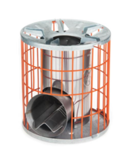
Rocket Works Zama Zama |
Firewood | 30-50% | 31.8 % | Carbonsink | Imported from Botswana | |
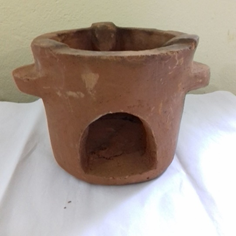
Poupa-lenha |
Firewood | 30-50% | 25.2 % | Carbonsink | Locally produced | |
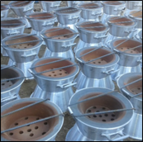
Aluminium stoves |
Charcoal | 45% | Sogepal | Locally produced | ||

ACE Smart stove with solar Panel (10W), LED light and wall charge |
cashew shells | 42% | Pamoja | The stove itself is manufactured by African Clean Energy (ACE) in Lesotho and then shipped to Nampula for distribution.
| ||
|
|
Electricity | BURN | Imported | |||
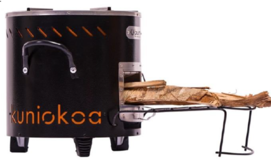
|
Firewood | 71% | BURN | Imported | ||
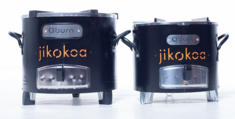
Jikokoa (Classic, Xtra and Pro) |
Charcoal | Pro - 33% | Classic - 54% | 1200 Mts | BURN | Imported |
FEDESMO has also developed a stove map with sales points for different types of stoves such as charcoal, institutional, mobile and fixed firewood cookstoves[3][7]. This database is however not up-to-date.
Further Information
- Energy Access Situation in Mozambique
- ICS in Mozambique: Market Landscape
- ICS in Mozambique: Consumer Insights
- ICS in Mozambique: Challenges and Recommendations for the Private Sector
- Case studies from the sector
References
- ↑ Kameshnee Naidoo and Christiaan Loots, ‘Mozambique / Energy and the Poor – Unpacking the Investment Case for Clean Energy’, 2020, https://sun-connect-news.org/fileadmin/DATEIEN/Dateien/New/2021-01-29_UNDP-UNCDF-Mozambique-Energy-and-the-Poor.pdf.
- ↑ BERF, ‘Business Environment Constraints in Mozambique’s Renewable Energy Sector: Solar PV Systems and Improved Cook Stoves’, 2016.
- ↑ 3.0 3.1 ‘ALER - Resumo Renovaveis Em Mocambique 2021’, https://www.lerenovaveis.org/contents/lerpublication/aler_mar2021_resumo-renovaveis-em-mocambique-2021.pdf.
- ↑ Webinar: Clean Cooking in Mozambique: Market Status and Opportunities for Private Sector
- ↑ EnDev, ‘Workshop Energy Market Scorecard Mozambique ICS 2020’, 2020.
- ↑ ‘Market Segments – GET.Invest’
- ↑ FEDESMO, ‘FEDESMO: Sustainable Energy and Development Forum of Mozambique’, https://naturvernforbundet.no/getfile.php/1344431-1354528791/Dokumenter/Div.%20vedlegg%20til%20nettsaker/Fact%20sheet%20on%20FEDESMO.pdf.

